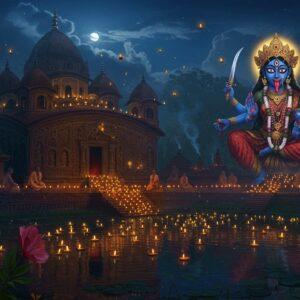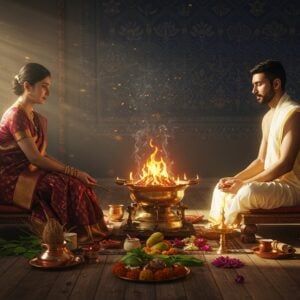Hinduism, a faith steeped in ancient traditions, is characterized by a rich tapestry of rituals that have been practiced for millennia. These rituals are not merely religious observances; they are deeply ingrained in the fabric of Hindu society, reflecting spiritual values and cultural heritage. By exploring these traditions, we can gain a deeper appreciation for the profound spirituality and enduring values they represent.
A Journey Through Time: Historical Context and Origins
The roots of Hindu rituals can be traced back to the Vedic period, with the Vedas, the oldest Hindu scriptures, providing the foundation for many ceremonies. Over centuries, these rituals have evolved, influenced by various dynasties and cultural exchanges. Sacred texts like the Upanishads, Puranas, and Bhagavad Gita have further shaped these practices, passed down through generations by learned scholars, or ‘pandits’. The diverse cultural landscape of India is reflected in the regional variations of these rituals.
The Spectrum of Hindu Rituals
Hindu rituals encompass a wide range of practices, broadly categorized into daily, life-cycle, and seasonal/annual observances.
- Daily Rituals: These include ‘puja’ (worship), often incorporating offerings of flowers, incense, and light; ‘aarti’ (the ceremonial lighting of lamps), symbolizing the dispelling of darkness and ignorance; and ‘sandhyavandanam’ (prayers offered at dawn and dusk), connecting individuals with the cyclical nature of time and the divine.
- Life-Cycle Rituals (Samskaras): These rituals mark significant milestones throughout an individual’s life, from birth ceremonies celebrating new life to marriage ceremonies uniting two souls and funeral rites honoring the departed.
- Seasonal/Annual Rituals: These rituals are often associated with major festivals like Diwali, the festival of lights symbolizing victory over darkness; Navaratri, a nine-night celebration honoring the divine feminine; and Holi, the festival of colors signifying the triumph of good over evil. These vibrant celebrations foster a sense of community and continuity, bringing people together in shared joy and devotion.
The Spiritual Heart of Rituals
Hindu rituals serve as a powerful link between individuals and the divine, fostering spiritual growth and understanding. The concept of ‘dharma’ (duty) emphasizes the importance of rituals in fulfilling one’s spiritual responsibilities. ‘Mantras’ (sacred chants) are believed to invoke divine energy, while ‘yajnas’ (sacrificial rituals) are performed for purification. ‘Bhakti’ (devotion) is expressed through love and reverence towards deities. Performing rituals with sincerity is believed to generate positive karma, aligning with the fundamental principle of cause and effect.
Cultural and Social Significance
Deeply interwoven with Indian festivals, music, dance, and art, Hindu rituals play a vital role in preserving cultural heritage and fostering social cohesion. They strengthen family bonds and bring communities together, transmitting traditions and values to younger generations. These rituals mark life transitions, providing a sense of stability and continuity even as they adapt to modern times.
Sacred Objects: The Significance of Ritual Items
Hindu rituals often involve the use of various items, each imbued with symbolic meaning. Understanding the significance of these items enriches the spiritual experience.
Essential Ritual Items and Their Symbolism
- Kumkum (Vermilion): This red powder, often applied to the forehead, symbolizes auspiciousness, power, and purity.
- Chandan (Sandalwood Paste): Known for its cooling properties, chandan represents calmness and serenity, invoking peace and tranquility.
- Diyas (Lamps): The lighting of diyas symbolizes the dispelling of darkness and ignorance, ushering in light and knowledge.
- Prasadam (Offering): Food offered to deities and later shared among devotees, prasadam symbolizes sharing, community, and divine blessings.
- Yantras (Geometric Diagrams): These mystical diagrams represent various aspects of the divine and are believed to focus spiritual energy.
- Murtis (Idols): Serving as a focal point for devotion and prayer, murtis are treated with reverence and adorned with offerings.
- Tulsi (Holy Basil): Considered sacred for its purifying qualities, tulsi symbolizes devotion and purity.
- Rudraksha Beads: Used in prayer beads, rudraksha beads are believed to offer spiritual benefits and protection.
- Ghanta (Bell): The ringing of the bell purifies the atmosphere and signifies the presence of the divine.
How Poojn.in Enhances Your Spiritual Journey
At Poojn.in, we recognize the profound significance of Hindu rituals and offer a wide selection of authentic items to support your spiritual practices.
- Authenticity and Quality: We source our products from trusted artisans, ensuring the purity and integrity of traditional items like kumkum, chandan, and rudraksha beads. You can find a variety of Lord Shiva Murtis, Maa Kali Murtis, and Maa Lakshmi Murtis crafted with meticulous detail.
- Comprehensive Selection: From camphor and dhotis to brass kulos, we offer a complete range of products to meet your diverse ritual needs. Explore our collection of standing Shiva murtis and Ganga Shiva murtis for a truly immersive experience.
Preserving Tradition in the Modern Age
Understanding the significance of Hindu ritual items deepens our connection to our rich cultural heritage. In today’s fast-paced world, Poojn.in provides convenient access to these sacred items, ensuring quality and authenticity. By choosing traditional, high-quality products, we honor the sanctity of our rituals. Let us cherish these customs and pass them on to future generations, keeping our heritage vibrant and alive.
Frequently Asked Questions about Hindu Rituals
What is the role of the Hindu Calendar? The Hindu Calendar guides followers in observing important festivals, rituals, and auspicious days, providing a framework for religious practices.
Why are there 16 Sanskars in Hinduism? The 16 Sanskars mark key life stages, from birth to death, guiding individuals on their spiritual journey.
Which are some major Hindu festivals? Diwali, Holi, Navratri, and Raksha Bandhan are among the major Hindu festivals, each celebrating different deities, seasons, or historical events.
What are the key rituals in a Hindu marriage? Kanyadaan, Mangal Pheras, and Saptapadi are essential rituals in a Hindu marriage, symbolizing the sacred union of two souls.
What is the purpose of puja in Hinduism? Puja is an act of worship and devotion, offering prayers and gratitude to deities.
How do post-death rituals benefit the deceased? Rituals like Shraddha and Tarpan help the deceased’s soul find peace and transition to the afterlife.
What is the process of cremation in Hinduism? Cremation involves burning the body on a pyre, symbolizing the soul’s release from the physical realm.
Why are rituals important in Hinduism? Rituals connect individuals with the divine, purify their souls, mark significant life events, and preserve cultural heritage.


